April 08th, 2024
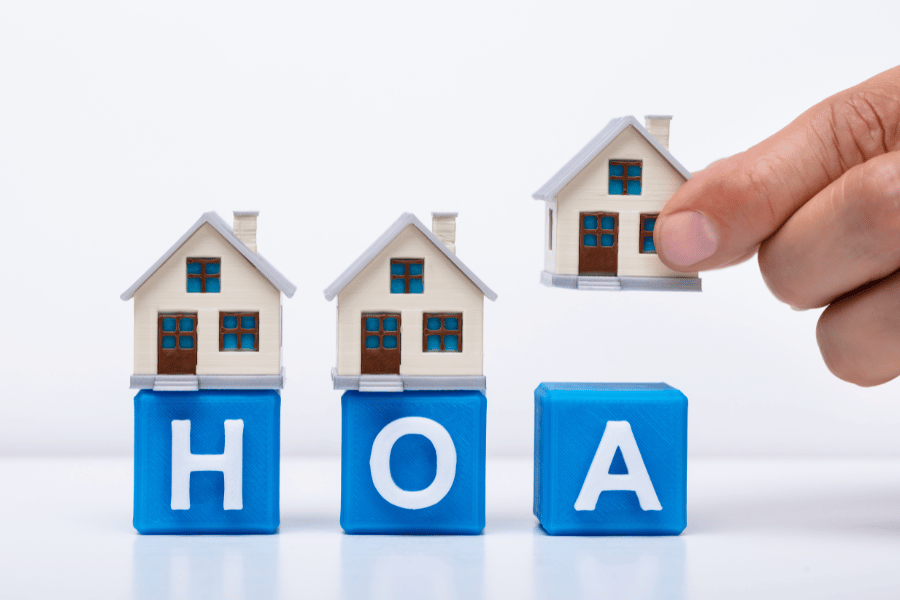
What is an HOA? The Ultimate Guide to Homeowners Associations
Are you searching for a home and wondering what an HOA is and if it is a good fit for you? Keep reading to learn more about HOAs.
A Homeowners' Association (HOA) is an organization that establishes and enforces regulations and standards for a neighborhood or condo. HOA provides many benefits, including amenities, maintenance, security, and other services. However, it has some disadvantages, such as fees, restrictions, and bureaucracy.
Living in a community that an HOA manages is quite common. A board of directors usually leads an HOA comprised of volunteers who oversee the community. There are over 370,000 homeowner associations in the US, encompassing more than 40 million households, which is over 53% of all households.
Everyone has their own opinions on HOA, so if you are wondering if living in an HOA community is for you, keep reading to learn more about the homeowners association and everything that goes into it.
Here is the ultimate guide to homeowners associations (HOA).
What is an HOA?
An HOA, a homeowner's association, is a non-profit committee run by a board of directors that enforces neighborhood regulations. The board of directors is typically made up of neighborhood volunteers who devote their time to overseeing the maintenance and use of shared spaces and ensuring the CC&Rs (covenants, conditions, and restrictions) are followed by all.

HOA Fees
Homeowner's association fees are the payments made by property owners to the HOA organization to maintain community aspects. These fees are mainly for shared spaces, amenities, and neighborhood landscaping. When you purchase a property in an HOA, you automatically become a member and must pay dues.
The HOA fee is usually due monthly but can also be an annual payment. Before becoming a member, you will be informed about the cost. Additionally, the HOA may charge a one-time home stranger fee upon your property purchase.
They can also impose special assessments to cover the cost of unexpected repairs. Special assessments can be one-time or ongoing fees on top of your regular dues. HOA boards typically don't have to poll or even notify residents before they do.
To hold you accountable for your fee, your lender will include the HOA fee in your monthly mortgage, ensuring you remember a payment, miss a payment, or go over budget.
What Fees are Used For
Once you have paid your fee to the HOA management, it is generally utilized to maintain the common areas in your community. In a neighborhood consisting of single-family homes, your HOA fee is usually allocated to services such as landscaping, road maintenance, snow removal, and other similar services.
If you live in a condominium, your HOA fees will typically go towards maintaining the building's lobbies and common areas, elevators, swimming pools, parking spaces, and more.
Paying your HOA fee on time is crucial to avoid serious consequences. Make sure to make a payment or choose not to pay to avoid losing your home. If you miss the deadline for paying your dues, your homeowner's association can place liens on your home and even foreclose on those liens. So, you must be quick with your HOA fee payments so you don't have to worry about unpleasant situations.
If you plan to sell your home, the lien must be paid and taken care of before selling. The HOA can go through with the foreclosure even if you are paying your mortgage on time, so it's essential to keep up with when your fee is due. A less severe repercussion is being charged a late fee or interest until it's paid.
Homeowners' associations (HOAs) can only allow access to common areas or amenities if you pay your dues on time. The HOA can hire a collection agency to recover the unpaid fees if you miss payments.
In addition, the HOA can take legal action against you. They can sue you for the unpaid dues, fines, and any interest that has accrued, and they can also garnish your wages and seize the owed amount from your bank account.

Statistics
Here are some statistics about HOAs that will help you understand what they are and if living in an HOA community is a good fit for you.
- Monthly HOA fees average $170, according to U.S. Census Bureau American Housing Survey estimates.
- The majority of homeowners in HOAs pay less than $50 a month.
- 25.9% of the population living in North Carolina live in an HOA
- 74.2 million Americans, or 29 percent of the country's population, live in homeowner's associations, condominium communities, or co-ops, according to the Community Associations Institute (CAI).
- The midwest and Southern states have the lowest percentage of homes in HOAs
- HOA fees are affected by inflation and the rising cost of community managers
- About 47% of Gen Z are HOA members
- Men tend to spend more on HOA fees than women
- For 44% of homeowners, being a member of an HOA is an essential factor
Rules of an HOA
Homeowners Associations (HOAs) have different rules, but some are common. These rules are legally binding, and you agree to follow them by signing. The HOA rules are usually found in the covenants, conditions, and restrictions (CC&Rs), and they apply to everyone in the community, including tenants and homeowners.
HOAs can impose various restrictions, such as what plants and trees you can have in your yard and what colors you can use for your house, front door, or roof shingles. They may also restrict the type and height of fences, outdoor structures, decks, and pools and require specific maintenance standards.
Parking is another area that HOAs may regulate to ensure the safety of the community. They may limit the number of vehicles allowed on your property, restrict street parking, and prohibit recreational vehicles, boats, bicycles, and lawn equipment.
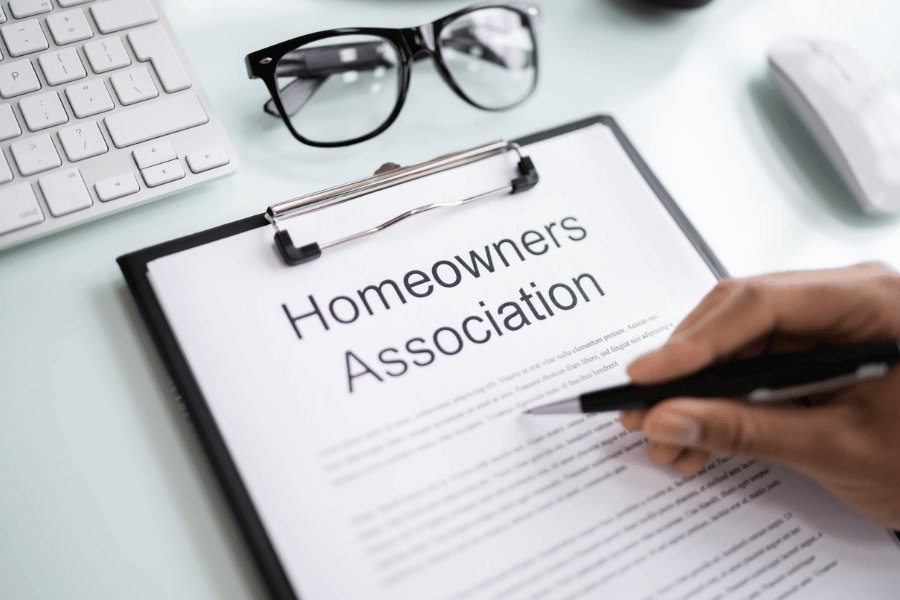
Pros and Cons of HOA
Everyone has their own opinions on HOA, so if you are wondering if living in an HOA community is for you, keep reading to learn more about the pros and cons of the homeowners association.
Pros of HOA
1. Provide Amenities
Many HOA communities offer their residents exclusive amenities that are only available to owners and residents. These amenities are considered perks maintained by the HOA and include pools, clubhouses, gyms, sports fields, and picnic areas.
While these amenities are semi-private, meaning that community members can access them, they do not have to worry about the upkeep.
These amenities help create a sense of community throughout the neighborhood by offering social gatherings and activities throughout the year. One of the benefits of these amenities is that they provide things that some people may not be able to afford on their own, making them more accessible and affordable near the comfort of their homes.
2. Reduce Responsibilities
The HOA is in charge of overseeing the community, so they handle the landscaping duties as well as maintenance for common areas and amenities. This helps improve curb appeal and increase home values throughout the neighborhood, which can help the selling process.
It's beneficial to have community members in charge as they can help in various ways. Homeowners' Associations (HOAs) often provide additional services such as trash collection, pest control, and other amenities that can improve your quality of life while saving you time and money.
Although your fees may seem excessive, they cover essential services such as maintenance, trash removal, snow removal, and other tasks you won't have to handle alone. While paying for these services, they provide a valuable return that helps to enhance your quality of life.
3. Keep Up Appearances
Most HOAs handle a large part of a home's exterior upkeep, so you do not have to. Many of these include the following. Remember that each HOA is different, so know what your community offers.
- Landscaping
- Pest control
- Trash pickup
- Cleaning/painting exterior
- Snow removal
- Maintaining common areas
- Repairing roads, walls, buildings
Homeowners associations (HOAs) usually have a lot of regulations and guidelines regarding how homes and the overall community should look. These rules are in place to prevent property neglect and maintain property values for the houses and the community. Compared to neighborhoods without HOAs, those with them usually look more well-maintained and newer, even if they are older communities.
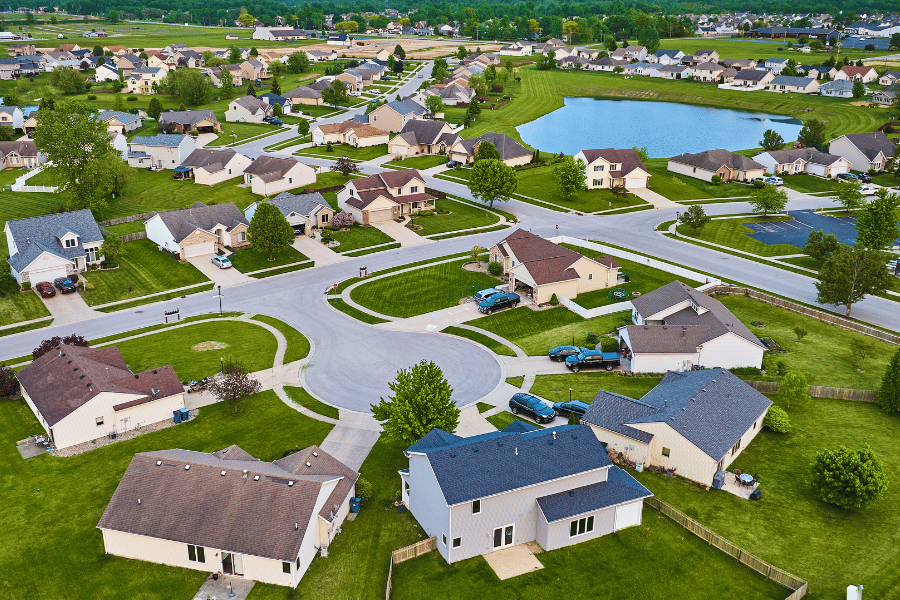
Cons of HOA
1. Fees
Homeowner's associations (HOAs) have many benefits, but the fees are why some people avoid them. The HOA fee is the amount of money the organization collects from homeowners to maintain the community.
It is mandatory to pay these dues once you become a member of an HOA, and the fee will be disclosed before you buy a home. Apart from monthly or annual payments, you may also have to pay a one-time home stranger fee when purchasing the property.
However, it's essential to know that these fees go towards maintaining the community and all the amenities and services offered to residents. Every HOA has different fees ranging from $100 to $1,000, so it's essential to know that every neighborhood varies.
2. Covenants and Rule Restrictions
Each homeowners association (HOA) has its own set of covenants and restrictions in place, which cover matters such as exterior paint colors, decoration guidelines, parking regulations, and rental policies. These rules tend to be in place to help regulate the community and boost the homes' curb appeal.
Many individuals need to appreciate being instructed on how to decorate or manage their homes so they avoid living in communities governed by Homeowners' Associations (HOAs). Listed below are some of the most common violations enforced by HOAs.
- Exterior home paint color
- Garbage given to the public
- Unkempt conditions like peeled paint or mildew
- Unapproved shutters
- Hose, toys, and miscellaneous objects left in the driveway
On the other hand, an HOA can stop you from renting out your own home, which many people would like to avoid. HOAs can impose many rental restrictions and disallow certain pets. Every HOA is different, so know the community master plan.
3. Possibility of Poor Management
Homeowners Associations (HOAs) are run by volunteers from within the community. This means that they are only sometimes professionals and sometimes make mistakes. Unfortunately, a poorly managed HOA can lead to community mismanagement, financial misappropriation, and abuse of power. Many HOAs face lawsuits due to their inability to maintain the community effectively.
If the HOA is lacking in money or anything, the whole community is on the same line. They are all one, so the residents also hold that responsibility if your management messes up. On the other hand, sometimes there are lousy board members who will be very stingy about little things, which is one of the main cons people think of when it comes to HOAs.

Methodology
We used information from different sources and our data to create the ultimate guide about HOAs. There were various data to use, so we put them together to guide you on what you should know about HOAs.
We used The following sources to gather most of our information about HOAs.
FAQS
Why do people join HOAs?
Many people prefer to join the HOA board members because they have better control over the community rules and maintenance than having someone else do it.
What are some advantages and disadvantages of an HOA?
HOA communities offer many benefits, including amenities, security, maintenance, etc. Still, on the other hand, there are some cons, such as fees, conflicts, bureaucracy, and restrictions.
What is the point of living in a HOA?
Living in an HOA stabilizes home values, maintains common areas, and enforces strict home appearance rules to keep the neighborhood well-kept.
What is an HOA? The Ultimate Guide to Homeowners Associations - The Bottom Line
Living in a Homeowners Association (HOA) community has advantages and disadvantages, but ultimately, the decision is yours. HOAs vary in effectiveness and efficiency, and the quality of management can differ from one association to another.
If you are considering moving to a community with an HOA, it is crucial to understand its status, plans, and board members to determine if it is a good fit for you. According to recent statistics, approximately 63% of residents in HOA communities have responded positively about their experience.
HOAs can help alleviate some of the headaches of homeownership while providing facilities and amenities you might need help managing. However, everyone has their lifestyle preferences, so it is vital to research and understand each HOA's specifics when choosing a neighborhood to reside in.
If you want to move or need help selling, contact us or visit our website. Our team at is here to help you with any home buying or selling needs.

Ryan Fitzgerald
Hi there! My name is Ryan Fitzgerald, and I am a REALTOR®. My goal is to help you learn more about real estate through our Real Estate Blog! Hopefully, you enjoyed the above blog post and it found a way to provide help or value to you. When you're ready to buy or sell a home of your own let us know here. Please feel free to join the conversation by dropping us a comment below.
Related Blogs

Are you debating if this is the right time to buy a house? Take a look at the homeownership rates over the last 20 years to decide if this is the right time for you.
February 22nd, 2024
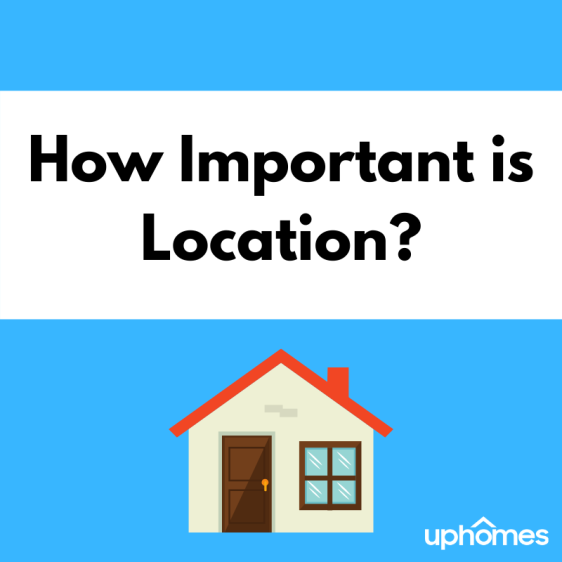
How Important is Location When Buying a Home? One of the most common questions we are asked is 'how important is location when buying a home.' Location is the most important factor in real estat...
January 03rd, 2021

What to Look for When Buying a House With so many factors that go into it, knowing what to look for when buying a house can help you stay focused and confident in your purchase. Many homebuyer...
November 11th, 2020
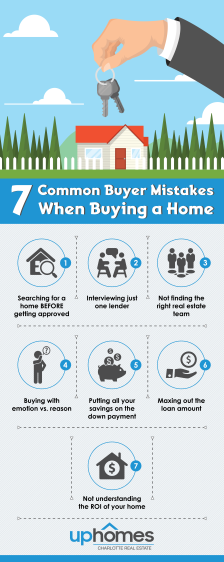
7 Common Mistakes Buyers Make When Buying a Home from Charlotte, North Carolina Realtor®, Ryan Fitzgerald ... Don't make these mistakes!
February 21st, 2018

